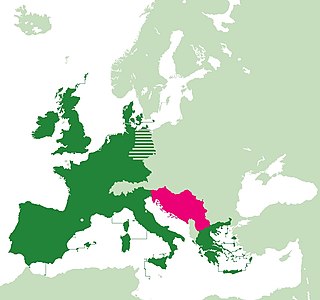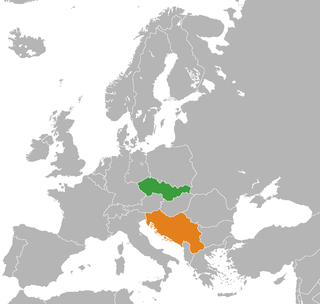
Yugoslavia was a country in Southeast and Central Europe that existed from 1918 to 1992.

Since the breakup of the Socialist Federal Republic of Yugoslavia in the early 1990s, the foreign policy of the newly established Federal Republic of Yugoslavia was characterized primarily by a desire to secure its political and geopolitical position and the solidarity with ethnic Serbs in other former Yugoslav republics through a strong nationalist campaign. While the country was involved in Yugoslav Wars and therefore exposed to several rounds of devastating sanctions against Yugoslavia this involvement was often denied for political or ideological reasons. In the initial period Federal Republic of Yugoslavia unsuccessfully aspired to gain international recognition as the sole legal successor state to SFR Yugoslavia, the country which was one of the most prominent foreign policy subjects during the Cold War.
Succession of states is a concept in international relations regarding a successor state that has become a sovereign state over a territory that was previously under the sovereignty of another state. The theory has its roots in 19th-century diplomacy. A successor state often acquires a new international legal personality, which is distinct from a continuing state, also known as a continuator or historical heir, which despite change to its borders retains the same legal personality and possess all its existing rights and obligations.

The Socialist Federal Republic of Yugoslavia (SFRY), commonly referred to as SFR Yugoslavia or simply as Yugoslavia, was a country in Central and Southeast Europe. It emerged in 1945, following World War II, and lasted until 1992, with the breakup of Yugoslavia occurring as a consequence of the Yugoslav Wars. Spanning an area of 255,804 square kilometres (98,766 sq mi) in the Balkans, Yugoslavia was bordered by the Adriatic Sea and Italy to the west, by Austria and Hungary to the north, by Bulgaria and Romania to the east, and by Albania and Greece to the south. It was a one-party socialist state and federation governed by the League of Communists of Yugoslavia, and had six constituent republics: Bosnia and Herzegovina, Croatia, Macedonia, Montenegro, Serbia, and Slovenia. Within Serbia was the Yugoslav capital city of Belgrade as well as two autonomous Yugoslav provinces: Kosovo and Vojvodina.
The Yugoslav First Federal Football League, was the premier football league in the Kingdom of Yugoslavia (1918–1941) and Socialist Federal Republic of Yugoslavia (1945–1992).

The Central European Initiative (CEI) is a forum of regional cooperation in Central and Eastern Europe, counting 18 member states. It was formed in Budapest in 1989. The body was developed on the basis of earlier experiences with The Alps-Adriatic Working Group. The CEI headquarters have been in Trieste, Italy, since 1996.

After a period of political and economic crisis in the 1980s, constituent republics of the Socialist Federal Republic of Yugoslavia split apart, but the unresolved issues caused a series of inter-ethnic Yugoslav Wars. The wars primarily affected Bosnia and Herzegovina, neighbouring parts of Croatia and, some years later, Kosovo.

Yugoslavia participated in the Eurovision Song Contest 27 times, debuting in 1961 and competing every year until its last appearance in 1992, with the exceptions of 1977–1980 and 1985. Yugoslavia won the 1989 contest and hosted the 1990 contest.

Yugo-nostalgia is an emotional longing for the former country of Yugoslavia which is experienced by some people in its successor countries: the present-day Bosnia and Herzegovina, Croatia, Montenegro, North Macedonia, Serbia, Kosovo, and Slovenia. It is a political and cultural phenomenon that includes nostalgia for a time past when the splintered states were a part of one country, grief over the war that tore it apart, and a desire to again unite. Self-described "Yugo-nostalgics" may assert their grief at the failure of brotherly love, unity, and coexistence, and their distress at division and nationalism, or they may assert that their quality of life was better in Yugoslavia.
The Arbitration Commission of the Conference on Yugoslavia was an arbitration body set up by the Council of Ministers of the European Economic Community (EEC) on 27 August 1991 to provide the conference on Yugoslavia with legal advice. Robert Badinter was appointed to President of the five-member Commission consisting of presidents of Constitutional Courts in the EEC. The Arbitration Commission has handed down fifteen opinions on "major legal questions" raised by the conflict between several republics of the Socialist Federal Republic of Yugoslavia (SFRY).

The emblem of Yugoslavia featured six torches, surrounded by wheat with a red star at its top, and burning together in one flame; this represented the brotherhood and unity of the six federal republics forming Yugoslavia: Bosnia and Herzegovina, Croatia, Macedonia, Montenegro, Serbia and Slovenia. The date imprinted was 29 November 1943, the day the Anti-Fascist Council for the National Liberation of Yugoslavia (AVNOJ) met in Jajce on its second meeting and formed the basis for post-war organisation of the country, establishing a federal republic. This day was celebrated as Republic Day after the establishment of the republic. The emblem of Yugoslavia, along with those of its constituent republics, are an example of socialist heraldry.

The Yugoslavia women's national basketball team was the women's basketball side that represented the Kingdom of Yugoslavia and Socialist Federal Republic of Yugoslavia from 1943 until 1992 in international competition, and were controlled by the Basketball Federation of Yugoslavia (KSJ).
The Ljubljana Bank was a bank named after and based in Ljubljana, then the capital of the SR Slovenia in SFR Yugoslavia.

Democratic Federal Yugoslavia was a charter member of the United Nations from its establishment in 1945 as the Socialist Federal Republic of Yugoslavia until 1992 during the Yugoslav Wars. During its existence the country played a prominent role in the promotion of multilateralism and narrowing of the Cold War divisions in which various UN bodies were perceived as important vehicles. Yugoslavia was elected a non-permanent member of the United Nations Security Council on multiple occasions in periods between 1950 and 1951, 1956, 1972–1973, and 1988–1989, which was in total 7 years of Yugoslav membership in the organization. The country was also one of 17 original members of the Special Committee on Decolonization.

From the establishment of the European Economic Community in 1957 until the breakup of Yugoslavia in the early 1990s, thus during the Cold War period, the Socialist Federal Republic of Yugoslavia was the first socialist state to develop relations with the organisation. Notwithstanding occasional and informal proposals coming from both sides, Yugoslavia never became a full member state of the EEC.
The Yugoslavia men's university basketball team was the men's basketball team, administered by Basketball Federation of Yugoslavia, that represents Socialist Federal Republic of Yugoslavia in the Summer Universiade men's basketball tournament.

The Socialist Federal Republic of Yugoslavia was one of the founding members of the Non-Aligned Movement. Its capital, Belgrade, was the host of the First Summit of the Non-Aligned Movement in early September 1961. The city also hosted the Ninth Summit in September 1989.

Robert “Bob” Rackmales was the American Chargé d'Affaires ad interim in the Socialist Federal Republic of Yugoslavia from May 1992 until July 1993 and has been teaching at Senior College for a decade.

Czechoslovakia–Yugoslavia relations were historical foreign relations between Czechoslovakia and Yugoslavia, both of which are now-defunct states. Czechoslovakia and the Kingdom of Serbs, Croats and Slovenes were both created as union states of smaller Slavic ethnic groups. Both were created after the dissolution of Austria-Hungary, itself a multinational empire unable to appease its Slavic populations or implement a trialist reform in its final years.

Israel–Yugoslavia relations were historical foreign relations between Israel and now split-up Socialist Federal Republic of Yugoslavia. Positive initial relations between the two states were subsequently negatively affected by the Arab–Israeli conflict and close relations between Yugoslavia and some Arab states, particularly Yugoslav relations with Egypt. Despite cancelation of the formal relations after the Six-Day War informal, commercial and cultural exchanges continued throughout the Cold War period.














